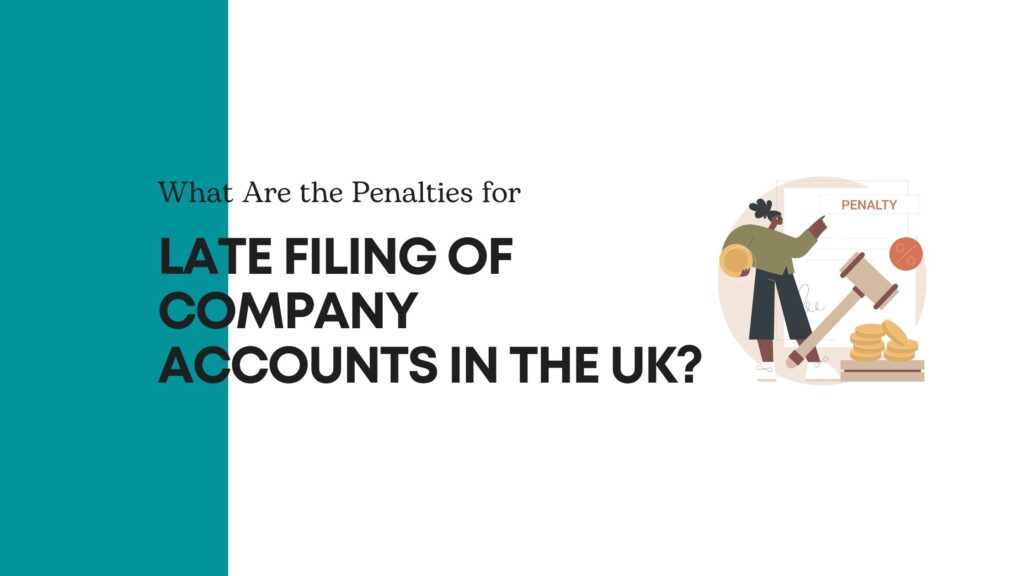Missing the deadline for filing company accounts can lead to significant penalties, including immediate financial consequences that escalate over time. In the UK, it is one of the most important legal obligations of businesses to file their company accounts on time. In this article, we’ll explain the penalties, deadlines, and legal risks involved if you don’t file your company accounts on time.
When Are the Filing Deadlines for Company Accounts?
Your filing deadline depends on the type of company you have. Knowing your deadline is crucial because penalties are automatic if you miss it.
- Private Companies: You must submit your accounts to Companies House within 9 months of the end of your financial year.
- Public Companies: The deadline for public companies is 6 months after the financial year-end.
For newly registered companies, the first filing deadline is different:
- Private Companies: You have 21 months from the date of incorporation to file your first accounts.
- Public Companies: You have 18 months to file.
If your company has recently shortened its accounting period, you should know that this can change your filing deadline, so it’s important to double-check.
What Are the Penalties for Late Filing of Company Accounts?
Penalties for late filing are automatic and increase the longer you delay. The fines differ for private and public companies.
Delay Period | Private Company | Public Company Penalty |
Up to 1 month late | £150 | £750 |
1 to 3 months late | £375 | £1,500 |
3 to 6 months late | £750 | £3,000 |
More than 6 months late | £1,500 | £7,500 |
If your company is late two years in a row, the penalties double. If you miss the deadline by more than six months for two consecutive years, the fine for a private company could rise to £3,000, and for a public company, it could reach a staggering £15,000.
Accounts & Tax Filing
For Non VAT Companies
We’ll take care of your company’s tax filing, year-end accounts, and bookkeeping. Starting at just £275, One-off payment, no hidden fees.
Free ConsultationWhatsApp UsCan Late Filing Lead to Legal Problems?
Financial penalties are not the only consequences of late filing. There could be serious legal consequences if your company constantly misses deadlines. Here are some potential outcomes:
- Criminal Offences: Late filing is a criminal offence under UK law. Directors may face prosecution, leading to a criminal record and even unlimited fines. This could also impact the company’s reputation.
- Company Strike-Off: If you continue to miss filing deadlines, Companies House may assume the company is no longer operating. As a result, they can strike off the company from their register, effectively dissolving the business. Once a company is struck off, its assets (including bank accounts) become the property of the Crown.
- Personal Liability for Directors: The company’s directors are personally responsible for ensuring that the company’s accounts are submitted on time. If they fail to meet this responsibility, they could face personal fines in addition to the company’s penalties. According to Companies House and the Companies Act 2006, directors can be held personally liable for repeated non-compliance, leading to potential fines and even a criminal record in severe cases.
What Can You Do If You Miss the Filing Deadline?
Missing the deadline for filing your company’s accounts can feel overwhelming, but it’s crucial to take action as soon as possible. The longer you delay, the higher the penalties become. There are steps you can take if you miss the filing deadline:
- File as Soon as Possible: The later you file, the larger the penalty, so submitting your accounts quickly is crucial once you realise you’ve missed the deadline. Each day you delay, the fine increases.
- Pay the Penalty: You can pay penalties online, through a bank transfer, or by sending a cheque. When paying, be sure to include your company name, registration number, and the penalty notice reference.
- Request More Time in Exceptional Circumstances: If unforeseen circumstances prevented you from filing on time, such as serious illness or a natural disaster, you can apply for an extension before the deadline. However, this is rarely granted and only in exceptional cases.
Why Is It Important to File Company Accounts on Time?
Filing company accounts on time isn’t just about avoiding fines. It’s a key part of showing that your company is well-run and compliant with UK business laws. Late filings can damage your company’s reputation with investors, clients, and partners. Your ability to win business contracts or secure financing can also be affected.
Moreover, directors’ legal responsibilities extend beyond just running the company day-to-day. They are legally required to ensure that the company’s financial records are accurate and submitted on time to Companies House. Failure to do so could affect the business and expose the directors to personal legal risks.
Final Thoughts on Late Filing Penalties for Company Accounts
The penalties for late filing of company accounts are designed to encourage businesses to stay compliant with their legal obligations. Private companies face penalties starting at £150 for late submissions, while public companies face much higher fines. Repeatedly missing deadlines can lead to criminal charges, company strike-offs, and directors’ personal liability.
Staying on top of filing deadlines is crucial to avoid unnecessary costs and legal headaches. Swiftacc can help you file your company accounts on time, ensuring compliance and peace of mind. Book a free consultation to take proactive steps to safeguard your business.
Frequently Asked Questions
Can I avoid filing penalties if my company is dormant?
No, dormant companies are required to file annual accounts with Companies House. Just like active companies, failing to file on time will result in penalties.
Can I delay filing if my accountant is ill?
No, as a company director, you are responsible for ensuring that accounts are filed on time, regardless of your accountant’s availability. If your accountant is ill, you’ll need to find alternative arrangements to meet the filing deadline.
How do I check my filing deadline?
You can check your company’s filing deadline by visiting the Companies House service and searching for your company name or number. The deadline is usually 9 months after your financial year-end.
Can I request an extension to file my accounts?
Yes, you can request an extension, but only if you do so before the original deadline and in exceptional circumstances, like a fire that destroys your company records.
Can a company be struck off for not filing accounts?
Yes, if a company fails to file accounts or returns, Companies House may start the process to strike off the company. Any assets owned by the company will be transferred to the Crown.

